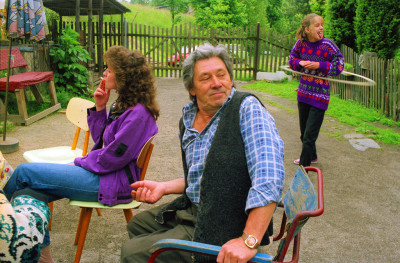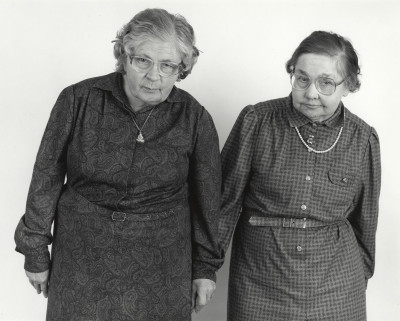
Letters from Ernestine K
Stefan Dolfen
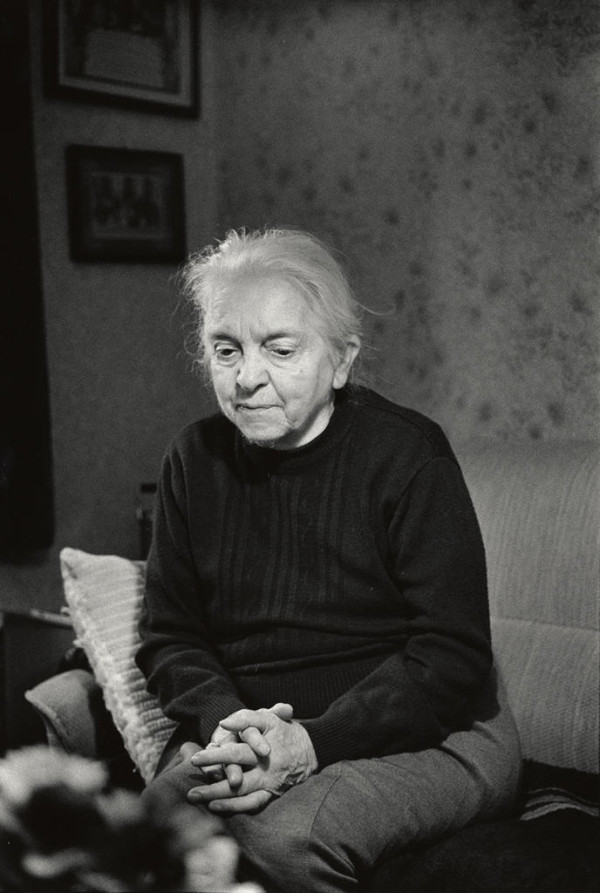
Letters from Ernestine K
Stefan Dolfen
- Photographic
- Communities
- International Documentary
- Portraits
- 1980 – 1989
- 1990 – 1999
- World
Letters from Ernestine K is a photographic series by Stefan Dolfen exploring life inside a psychiatric institution in Bethel, Germany in the late 1980s and early 1990s. The work combines portraiture and fictionalised letters to examine how mental illness is seen, represented and experienced. Dolfen spent extended time living and working within the community, building close relationships with some of the women he photographed and developing the project through shared trust and collaboration.
The portraits aim to challenge stereotypical imagery of the mentally ill, questioning how visual language shapes perception and empathy. The fictionalised letters, authored by Adelheid Rieffel, give voice to a collective identity represented by the name ‘Ernestine K’, providing a literary counterpoint to the images. The project examines the power dynamics of the photographer–subject relationship and invites the viewer to consider the ethics of documentary practice in sensitive environments.
Dolfen brought Letters from Ernestine K to Side Gallery in 1994, having participated in the Unclear Family photographic workshops in Crook, County Durham the previous year. His work with Side extended into the North East, where he produced Love of My Choice, a related project developed in Fishburn and Newcastle.
Stefan Dolfen is a German photographer whose long-term documentary work explores the effects of social and political change on communities and environments. His projects often combine careful visual observation with a commitment to exploring underrepresented perspectives. Dolfen’s practice spans themes including identity, migration and the transformation of public space.
I
Sabine has just explained to us something about care allowances. We disabled people come very dear. Are we dear to the state, to society I mean? Sometimes we are even treated like rubbish, pushed to one side. In my case that’s the way it seems to me when I read the newspapers. But society should know that it was all quite involuntary and none of my choosing – about the illness, I mean. I wish I were healthy. Then I would work so that handicapped people could live as I do. I must think about that sometime, how I’d find it. What do you think when your taxes keep going up? Surely not about me? But I bet it makes you cross! Best wishes, Your E.
II
Have you ever watched how they tug at my clothes, trying to smooth out my skirt? How they want to sit me in a way that isn’t comfortable? Ther may be crumbs sticking round my mouth breakfast until lunchtime, but my hair will be neatly combed! Sometimes I just can’t be bothered to open my eyes. Sometimes I simply don’t do it. That gives them all a good fright. Once when I did that, they called the doctor in. He understood me, because he asked if I would dance the Lambada with him. That made me open my eyes soon enough. I kept them open, too. So, who is your God, Mr. Photographer, who allows all this? Ernestine K.
III
The orderlies are up to something! We had a house meeting. Everyone could have their say in what they don’t like and what they would like to have. I’d like some plant pots for the balcony. Now comes the big one – I am to choose someone to help me do that. I have to choose myself. Once I wouln’t have had to do that. Everything would have been done. Now I am to do everything myself – even working out how much it will cost. They really are up to something, aren’t they? E. Whose side are you really on, Mr Photographer? I thought you were on my side? Do you think it’s right for me to see to the request for the plant pots myself? In fact you think it’s really good! Well then, there you are! But everything has its consequences. I don’t want to be bossed around, I’ll have to dig up the earth myself. The flowers will be my very own, my flowers which I planted myself and nurtured. Surely they must realise that! E.
IV
I can’t believe it. Surely it must be boring sometimes just waiting for the right moment to press the button. Do you get in a bad mood when the pictures don’t come out as you had wished. Do you think it’s good to be in a bad mood? Sabine says that whenever I’m in a bad mood I should tell her and then keep my bad mood to myself. But when she’s in a bad mood we all suffer for it. But I hadn’t looked at it this way before. Now it’s OK. It’s even good to have bad moods, as long as I’m aware of them. Sabine says that, and whenever she does I think about what she’s said. Sometimes I don’t want to. But she’s got the hang of it. She can explain to me something I don’t want to understand. Being in a bad mood doesn’t bear thinking about. I’ve done it – now you can as well. Ernestine
V
Did I frighten you with the question: “So, who is your God, who allows all this?” I meant to. He is mixed up in everything. I often fight him. But he never leaves me in peace. I blame it on him, that my life has turned out this way, that I am sitting here. After all, I tell him, he could have done something different with me. Only he didn’t. I am amazed, that he puts up with so much from me. I would long since have lost patience with someone like me. So I think, he really must have a lot of patience. Otherwise, it would often have been quite unbearable. It would be good, if you would consider and remember that this God, who is also my God, does exist, before you are as old as I am. Best wishes, Ernestine
VI
A miracle has happened. Walter was here. You know, my brother. We haven’t seen each other for 44 years. I recognised him straight away, even though he’s grown old. At first he didn’t know what to say. Nor did I. But I soon thought of something. We went into town for coffee. And I had to choose my own cake. I knew which one I wanted. We began to swap stories about the old days when we were children. I’d thought I’d forgotten them. Later on I showed him my room and said to the others: “This is Walter, my brother.” They all shared in my joy. He even stayed for dinner, although he didn’t really have the time. The others persuaded him. He couldn’t do anything else. Now they too know my brother Walter. He wants to come again. Do you think he will? Yours Ernestine
VII
Please don’t think that I just sit around all the time! For many years I went to the weaving mill. I had to learn everything from the first basics. First spinning. This was very arduous. Then I had to set up the loom. We had to tension the warp with metres and metres of thread. And threading through the comb was a never ending job, before I could finally start weaving. I wove nice coloured fabrics for aprons, kitchen towels, tablecloths and much more. We had a good time. We sang and laughed. We were a good community. Now I want to rest, I need some peace. I just like to remember. You have no idea what it was like. Ernestine.
VIII
That you were here for so short a time. All the same, you did have time for me. You told me about yourself. What you’ve done. How you see people. You said you were an a l i e n a t e d person. I didn’t know these foreign words, but you explained it to me that it meant distanced. I thought about it. I didn’t really understand what you meant. I have time to think things over, as you know. I’ll try to explain to you my thoughts on distance, well really distance and nearness. They are two sides of the same coin. When I distance myself, it can be for various reasons. First of all I want nothing to do with something, an opinion, a person. I’ve already been hurt enough. Then I cut myself off, so that I’m left in peace. I have nothing to do with them, I just withdraw. But I also withdraw when I want to be near something. When I’m longing for something so much it hurts – for someone to say something nice to me, for someone to like me, for someone to take my arm for once and not always someone else’s. But I can never bring myself to ask. Then I just distance myself. I close the door. That’s what I mean by distance and nearness. How about you? Ernestine
IX
Whenever I think about you, Stefan, being almost finished taking pics… I’m pushing the very thought to the back of my mind. It is the same as it has been in the past 68 years. There’s someone we would have liked to count on but what say do we have in it. We’re only disabled people. I never used to think I’d be able to do about anything about this. Today, though, we are sometimes ask our opinions, and our voices are quite often heard. I like that – being accepted at long last. But then whenever I’d like to express my desire for a particular person to remain close to me, all of a sudden, I don’t have a part to play that decision. No one asks my oppinion, nor are my feeling taken in account. And believe me. I have a great many feelings. Then I just say: “Close the door!” But to you. I’d really like to say:” Open the door!” That’s my life in a nutshell. Is that what lifes like? I’m used to it that way. I like it that way. E.K
X
Dear Mr. Photographer Dear Mr. Stefan! You say that my letters have helped to think over your understanding of humanity to even change in many instances. You also say that is it possible for a disabled person to live with dignity in a sheltered community. You say that through me you have learned that I am not only becoming decisive but can also decide for myself. Then you learned something about that. I’m glad. But I do still have one or two questions: Do you really believe that a reading observer and an observant reader will notice that I Ernestine K. represent many of my friends? Do you also think it obvious to them that Sabine represents some of the men and women on the staff. If not, then you have to make it clear to them. Therefore simply All the best Ernestine K.
XI
I prefer to call you Stefan, because you are the type of person I can talk to as a friend. The first set of photographs are finished! You appear to have gone to a lot of trouble in enlarging the photos. The things I used to find looked nice in photos, I can’t see in these photos. One thing will amaze you though and that is that I’m beginning to understand what you are trying to say in your photographs. If I look at a photograph of myself, I’m not exactly beautiful, but I do think of stories I could tell if I were to stand behind the photograph – not literally though. Then if I look at photographs of other people, I think of stories which they would tell too. If that’s what you mean then I totally agree with you. Yours, Ernestine PS: My own first attempts won’t give you much competition. E.
XII
A sound attitude, you said, that I have a passion for life. What a strange expression! I am old. Whether I have a passion for life is another question, but I want to live. Live until my death. I don’t want to have already died whilst I am still living. That has nothing to do with passion. I just want to be accepted, and to be taken seriously. Especially when I don’t know whether I have a will to live, or if I can carry on much longer. In these moments I need someone who will not simply put up with me, but will stand by and support me, will tell me that I have a dignified life, and that I am allowed to live, however weak or frail I may be. It’s also when I find it difficult to know what to do. That’s when it’s so good not to be alone. Is that a sound attitude? But a sound attitude is a special expression of admiration? In sixty years’ time, I hope that you will find someone who says something as nice to you. E.
XIII
You should have been there! I really felt like having an argument at dinner, and they didn’t notice, that I was in an argumentative mood I mean. I did manage it though. You could have cut the atmosphere with a knife. One thing did puzzle me, and that was that Sabine allowed us to quarrel. She merely looked over and said nothing. I think she likes to argue too. I felt really good afterwards. But I did wonder why she let us get away with it. We weren’t allowed to squabble at home. “Be quiet and eat up!” father used to say. Later on, when I came here at the age of 12, the nurses used to say exactly the same thing. “Quarrelling is a sin” was something else they used to say. A sin, it’s a sin that I’m ill. It’s a sin when I have to do something that I am forced to do. Consideration, I must always show some consideration. You can’t imagine just how it’s always been, sleeping with 15 strange girls in one dormitory. There was only a small stove in the far corner well away from my bed. They said I used to have fits. Father said it was good that was such a place like this for me. At school they laughed at me. Whenever I fell all of a sudden on the floor. Now I understand they were just afraid and didn’t know what to do. I didn’t laugh, I knew what was going on, and waited until the nurses helped me. After the fit, life carried on as normal. You are only onlookers. Somehow or other I became good friends with the other girls, even though I often used to like to be on my own. When I was at home I was constantly with my brothers. I had to look after them despite being under ten years old. Mother was dead. Together, everyone together. Now I have the choice. I can sit in my room and read or watch television, or be bored. I can now do whatever I want! See you soon, Ernestine.
XIV
You never told me that you could cook so well. We were all astonished. Our auxilliary can cook too, but we didn’t expect it from you. I don’t cook anymore. I used to have to cook for my father and brothers. It was too much for me. But I’ll glady eat, and especially gladly something delicious. I laid the table really nicely, with napkins, flowers and candles. I hope you noticed. I just wanted to do something on your last evening here. Perhaps you could have read a story. But of course Sabine always does this. Then there was the singing, but we have already talked about that. So how can I say goodbye in writing? Simply this: You remain our friend, don’t forget us, and try to visit us sometimes. I believe I feel a bit sad. Your old Ernestine K.
XV
I owe you an answer. You asked me if you could ask me some questions. I’ve thought it over. Yes, I’d like that! A young man such as you coming and taking an interest in me – that’s really unusual for me – and then you sit around, crouch down or stand around – silent – and just look. That worried me. What does he want? Can’t he speak? And then there’s this clicking from that contraption! I already have photographs of me, even some nice ones, besides I can always take a look in the mirror. Or can you see something else? I’m getting interested now. But I must say one thing: No picture without my consent, do you understand? See you soon Ernestine K.
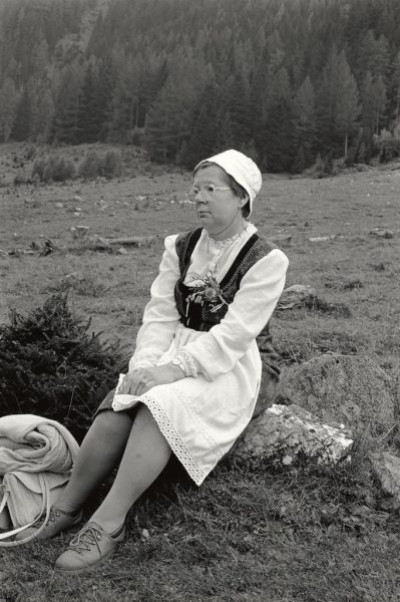
Letters from Ernestine K, late 1980s - early 1990s
- Ref: 192-007-PBW
- Date: late 1980s - early 1990s
- Artist: Stefan Dolfen
- Copyright: © Stefan Dolfen
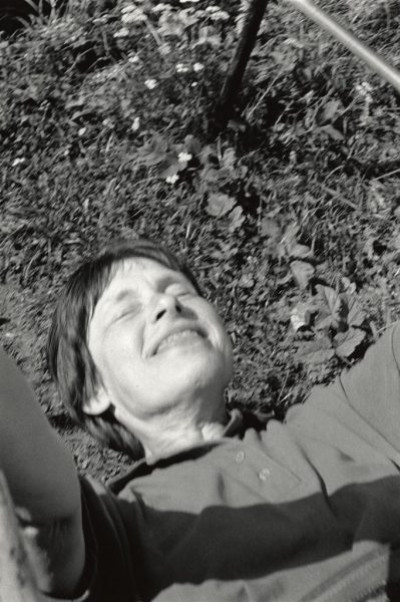
Letters from Ernestine K, late 1980s - early 1990s
- Ref: 192-011-PBW
- Date: late 1980s - early 1990s
- Artist: Stefan Dolfen
- Copyright: © Stefan Dolfen
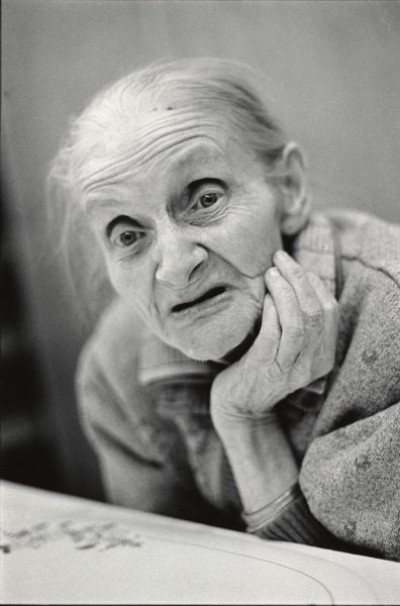
Letters from Ernestine K, late 1980s - early 1990s
- Ref: 192-006-PBW
- Date: late 1980s - early 1990s
- Artist: Stefan Dolfen
- Copyright: © Stefan Dolfen
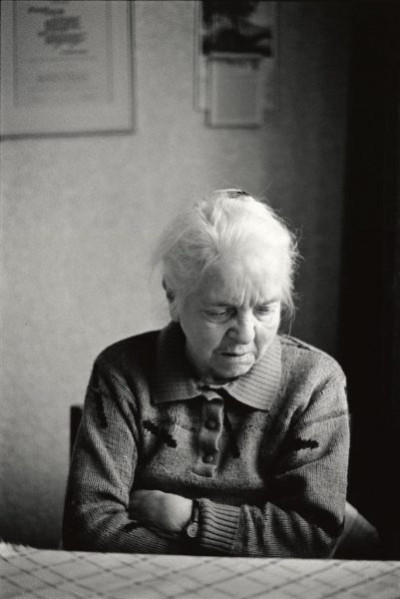
Letters from Ernestine K, late 1980s - early 1990s
- Ref: 192-004-PBW
- Date: late 1980s - early 1990s
- Artist: Stefan Dolfen
- Copyright: © Stefan Dolfen
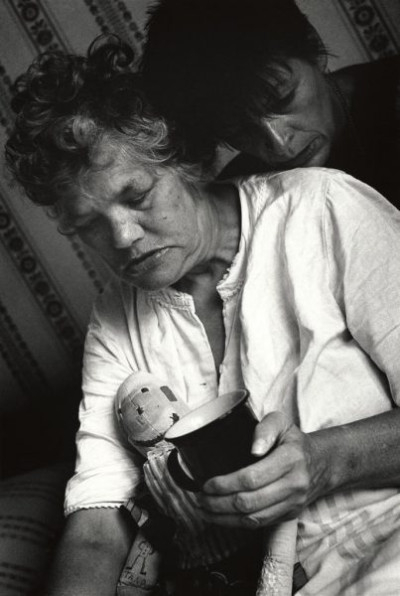
Letters from Ernestine K, late 1980s - early 1990s
- Ref: 192-010-PBW
- Date: late 1980s - early 1990s
- Artist: Stefan Dolfen
- Copyright: © Stefan Dolfen
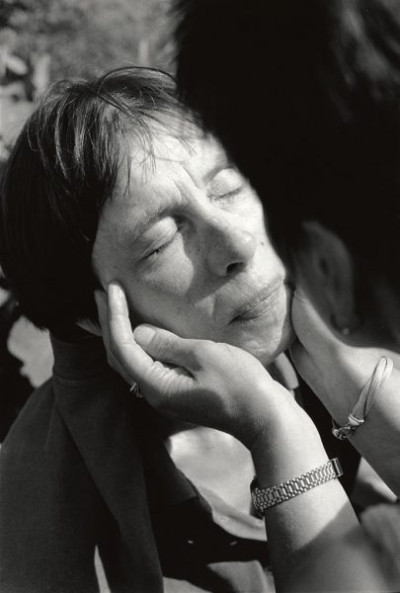
Letters from Ernestine K, late 1980s - early 1990s
- Ref: 192-009-PBW
- Date: late 1980s - early 1990s
- Artist: Stefan Dolfen
- Copyright: © Stefan Dolfen
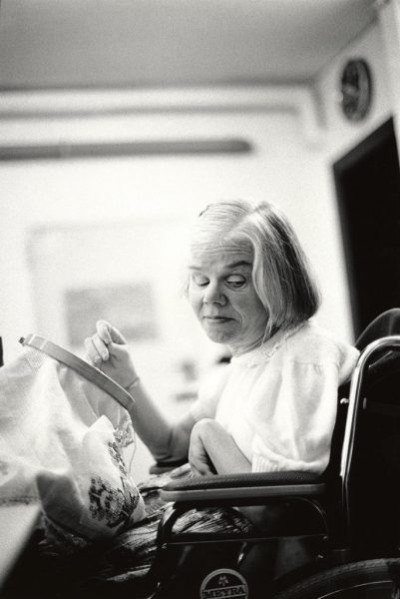
Letters from Ernestine K, late 1980s - early 1990s
- Ref: 192-002-PBW
- Date: late 1980s - early 1990s
- Artist: Stefan Dolfen
- Copyright: © Stefan Dolfen
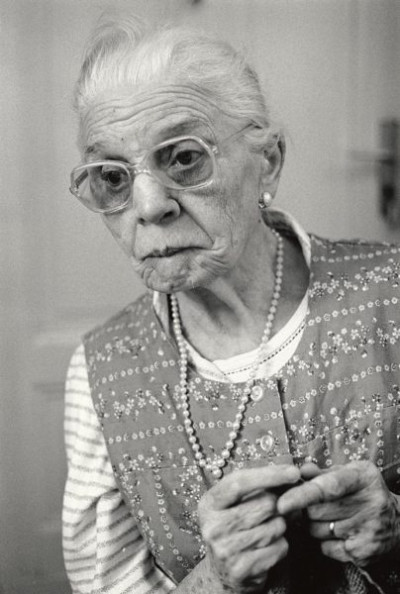
Letters from Ernestine K, late 1980s - early 1990s
- Ref: 192-008-PBW
- Date: late 1980s - early 1990s
- Artist: Stefan Dolfen
- Copyright: © Stefan Dolfen
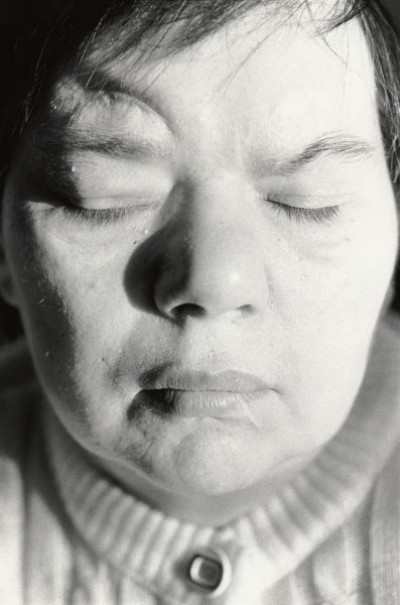
Letters from Ernestine K, late 1980s - early 1990s
- Ref: 192-014-PBW
- Date: late 1980s - early 1990s
- Artist: Stefan Dolfen
- Copyright: © Stefan Dolfen
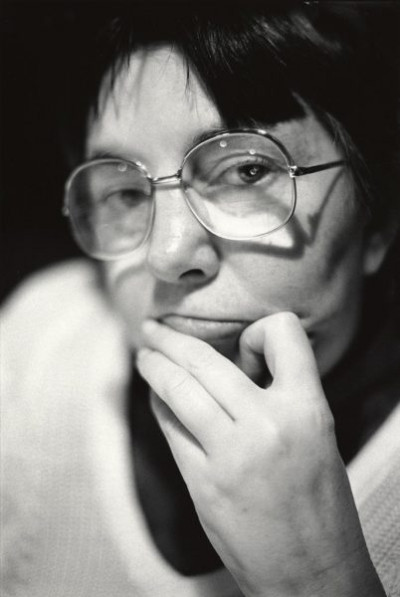
Letters from Ernestine K, late 1980s - early 1990s
- Ref: 192-015-PBW
- Date: late 1980s - early 1990s
- Artist: Stefan Dolfen
- Copyright: © Stefan Dolfen
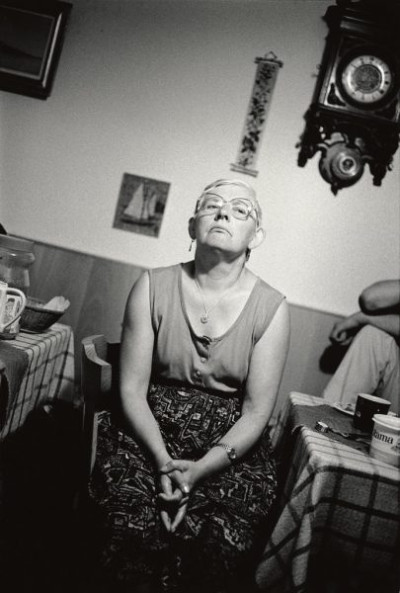
Letters from Ernestine K, late 1980s - early 1990s
- Ref: 192-005-PBW
- Date: late 1980s - early 1990s
- Artist: Stefan Dolfen
- Copyright: © Stefan Dolfen
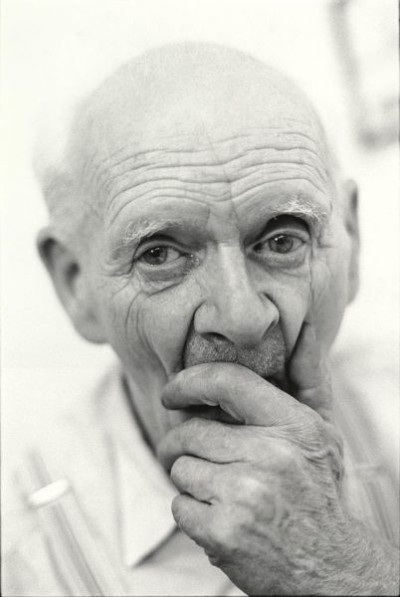
Letters from Ernestine K, late 1980s - early 1990s
- Ref: 192-013-PBW
- Date: late 1980s - early 1990s
- Artist: Stefan Dolfen
- Copyright: © Stefan Dolfen
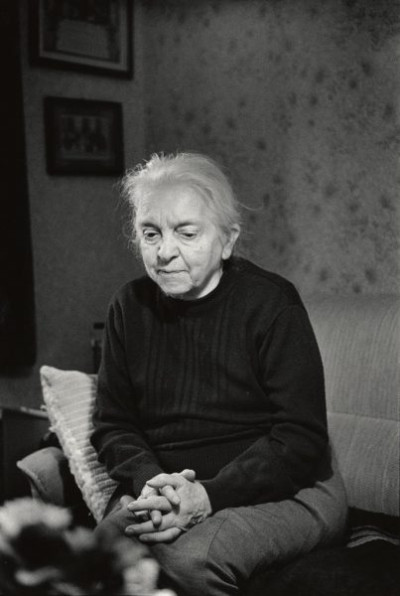
Letters from Ernestine K, late 1980s - early 1990s
- Ref: 192-003-PBW
- Date: late 1980s - early 1990s
- Artist: Stefan Dolfen
- Copyright: © Stefan Dolfen
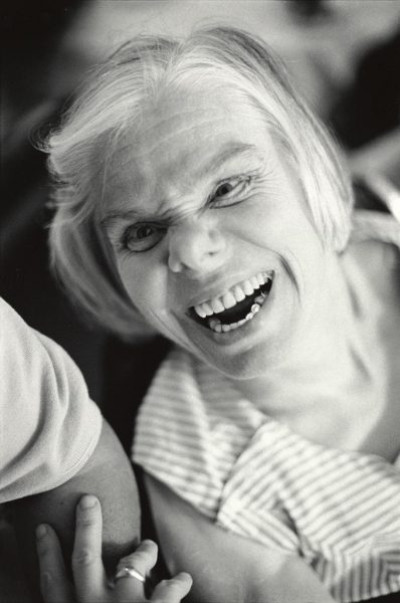
Letters from Ernestine K, late 1980s - early 1990s
- Ref: 192-012-PBW
- Date: late 1980s - early 1990s
- Artist: Stefan Dolfen
- Copyright: © Stefan Dolfen
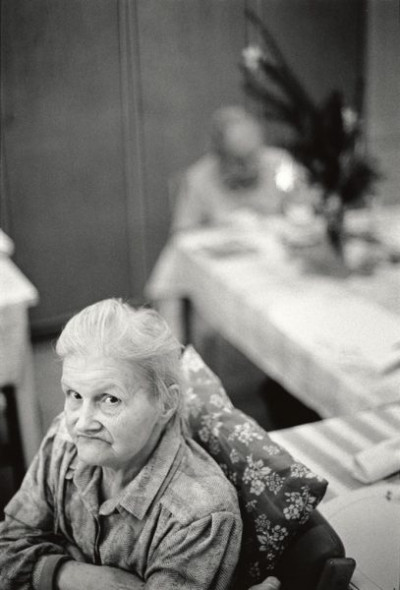
Letters from Ernestine K, late 1980s - early 1990s
- Ref: 192-001-PBW
- Date: late 1980s - early 1990s
- Artist: Stefan Dolfen
- Copyright: © Stefan Dolfen
Related Works

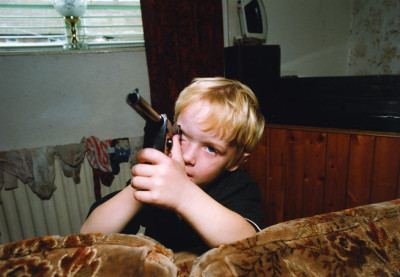
Unclear Family: Crook 1993
Dayanita Singh | Jindřich Štreit | Michelle Johnson | Mik Critchlow | Miriam Reik | Peter Bialobrzeski | Richard Cross | Richard Grassick | Stefan Dolfen | Steve Conlan | Tim Curtis
Photographic
